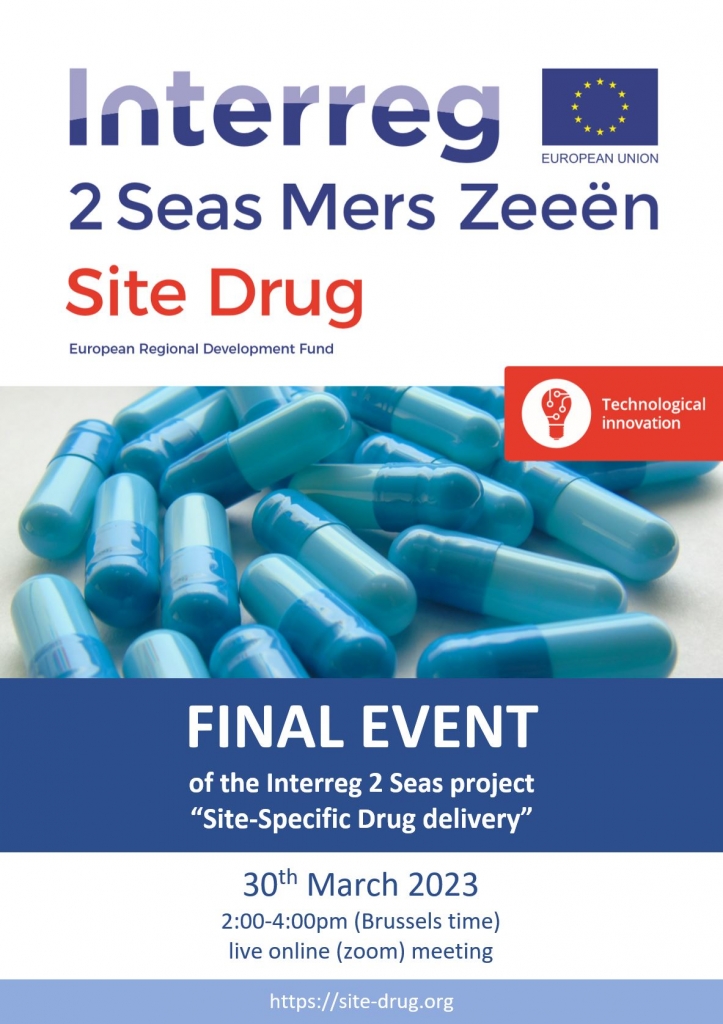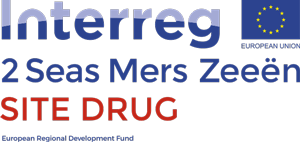FINAL EVENT of the Interreg 2 Seas project “Site-Specific Drug delivery”
on 30th March 2023 at 2:00-4:00pm (Brussels time)
live online (zoom) meeting
Participation is free of charge, but registration is required.

PROGRAMME
Welcome
Parenteral, biodegradable drug delivery systems: Importance of the in vitro release set-up
Prof. Juergen Siepmann, University of Lille, France
Advanced drug delivery systems for colon targeting
Prof. Abdul Basit, University College London, UK
Innovative implants for inner ear treatments
Dr. Julian Apachitei, University of Delft, The Netherlands
Drug loaded breast implants
Dr. Julien Payen, Lattice Medical, Loos, France
Cutting edge in vitro characterization techniques for local drug delivery systems
Prof. Axel Zeitler, University of Cambridge, UK
Towards more realistic drug release measurements
Frédéric Moens, ProDigest, Belgium
Closing

The large majority of drug products available on the market deliver the drug in a non-targeted manner into the human body: The drug is circulated via the blood throughout the entire organism. Only parts of it reach the target site (e.g., a specific organ), while the large majority of the administered drug dose is distributed within the rest of the body. Importantly, this drug is not only “lost” for the treatment, it is often harmful for the patient, causing potentially severe side effects. The latter have 3 major consequences, they:
1) Constitute a major health burden for the patient (e.g. causing nausea, headache, cardiovascular complications).
2) Can limit the drug dose that can be given to the patient, leading to nonoptimal therapeutic effects (the drug amount reaching the target site cannot be further increased).
3) Cause considerable costs for the health care systems (e.g., due to the treatment of side effects, prolonged.
The aim of the “Site Drug” project is to develop innovative drug products, which are able to control the resulting drug distribution in the patient’s body: The drug amount at the site of action is optimized, and the amount that is “lost” into the rest of the human body is minimized. This is achieved by “site-specific delivery systems”, which release the drug at a controlled rate at the site of action. Thus, the therapeutic efficacy are improved & undesired side effects reduced. This will help reducing the current cost burden on our healthcare systems due to adverse drug effects.
Four types of disease and disorders are specifically addressed:
- Crohn’s disease and ulcerative colitis using colon targeting systems
- Ovarian cancer with metastases in the peritoneal cavity with biodegradable controlled drug delivery systems
- Breast resection due to cancer using biodegradable breast implants releasing drugs in a controlled manner
- Hearing loss/deafness using miniaturized implants.
A highly interdisciplinary and complementary consortium of 10 academic and industrial partners in France, Belgium, The Netherlands and the UK is jointly working on this project: Delft University of Technology; Ghent University; Lattice Medical; Leiden University; Lille University Hospital; Prodigest; Technological Transfer Office North of France; University College London; University of Cambridge; University of Lille.
To register (free of charge) please send an email to alexandra.machado@univ-lille.fr, indicating your first and family name, position and institution.
Click below to download the flyer :
